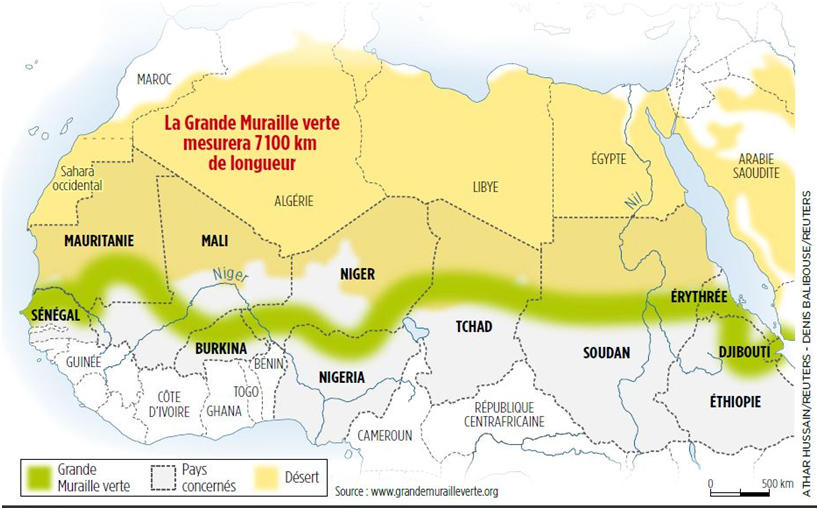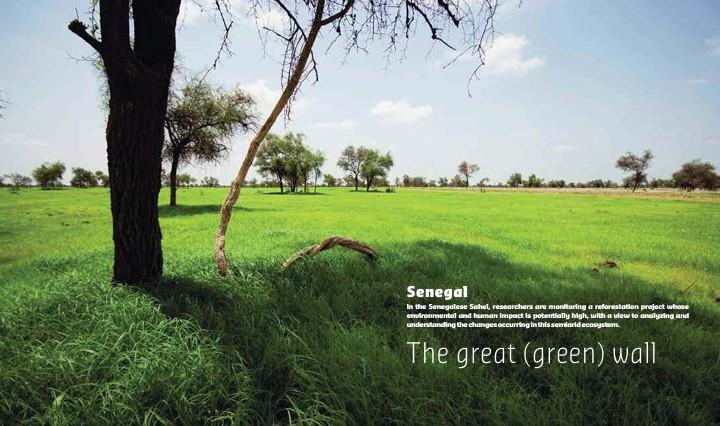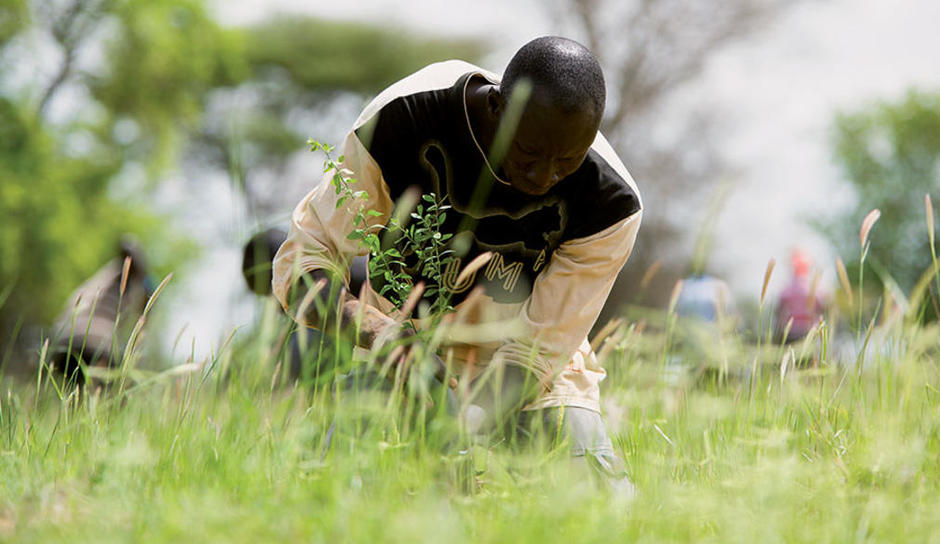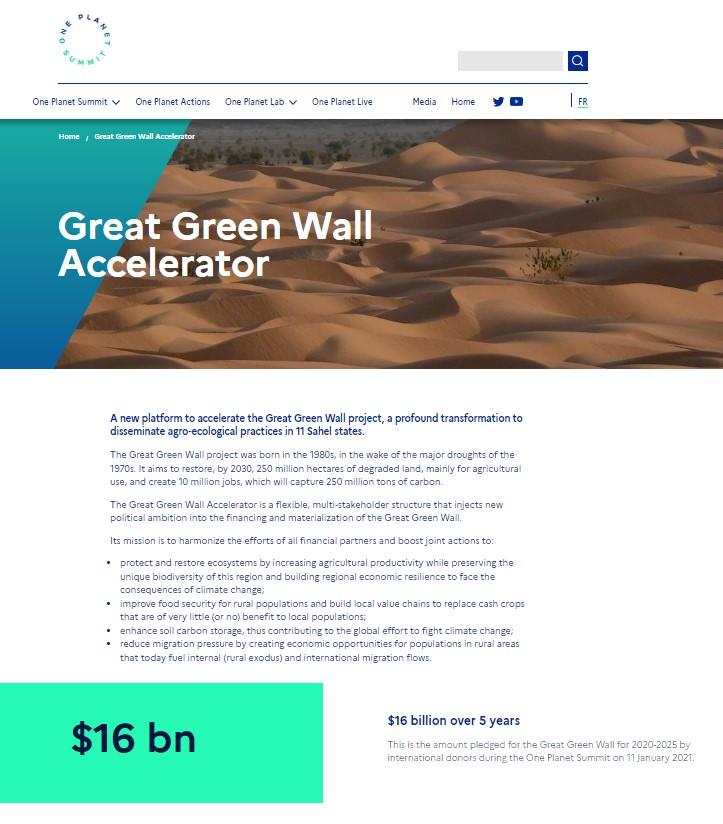
Environment and biodiversity
Place
African Sahel
Sponsor
Thierry Vandevelde
Grants
60 000 € by the 09/06/2011 Board of Directors
50 000 € by the 10/06/2013 Board of Directors
30,000 € by the 04/04/2016 Selection Committee
60 000 € by the 13/06/2022 Board of Directors (Afar-GMV)
60 000 € by the 13/06/2022 Board of Directors (Association Leeket-Bi)
10 000 € by the 13/06/2022 Board of Directors (Université Cheikh Anta Diop de Dakar)
Project Leaders
Observatoire Homme-Milieux de Tessekéré
Association française d'appui à la réalisation de la Grande Muraille Verte (Afar-GMV)
Association Leeket-Bi
Université Cheikh Anta Diop de Dakar (Ucad)
Senegalese President Abdoulaye Wade has described the Great Green Wall as a "crazy project" because its ambition goes beyond what has been imagined so far. This sustainable development project should help revitalise the African Sahel. One of the most vulnerable regions in the world, this arid zone is the focus of many climatic difficulties. In an attempt to give this cross-border territory a new lease on life, an initiative called the Great Green Wall for the Sahara and Sahel (GGW) was adopted in 2007. It aims, by 2030, to restore 250 million hectares of degraded land, mainly for agricultural use, and to create 10 million jobs. It is also expected to sequester 250 million tonnes of carbon.
7,675 km of plantations
Technically, this Great Wall is designed as a band of drought-adapted plant species. The objective of this plantation programme is to create an ecologically and economically viable tree zone for the local people. For these rural, partly nomadic populations, renovating an environment degraded by overgrazing, bush fires and regular water deficits is an imperative. When mature, the ziziphus, balanite and acacia trees will help develop the local economy, particularly through the harvesting of gum arabic.
The Great Green Wall in the press
The GGW involves 11 countries bordering on the Sahara/Sahel zone, ranging from Senegal to Djibouti, stretching across 7,675 km with an average width of 15 km. The part of the project involving Senegal extends 535 km and covers about 80,000 hectares. The country is a pioneer with respect to this issue and has been closely monitoring the results: around the villages, “versatile gardens” are now starting to produce fruits and vegetables.
A scientific research segment dealing with ecological restoration and forest regeneration
The initiative is monitored by the Man/Habitat Watchdog International (OHM.I). Based in Téssékéré, Senegal, this multi-disciplinary laboratory was founded in 2009 at the initiative of the Institute for Ecology and the Environment at the CNRS and of Cheikh Anta Diop University (Ucad) in Dakar. It includes botanists, plant ecology specialists, doctors, anthropologists and geographers, who are all studying this recovering environment through four fields of research: water and soil resources, biodiversity, social systems and health. In this way, the impact of reforestation can be measured in a wide range of scales like microbiology, ecosystems or sociology.
Supported by the Veolia Foundation, the OHM.I’s efforts aim at understanding, modelling and raising awareness about the dynamics and relationships between Man and the Sahel environments, as they were in past, as they are nowadays and as they will be in the future. Specifically, the idea is to analyse the ecological and social impact of the plantations, ranging from their effects on the climate and the biosphere to their influence on biodiversity and its dynamics, on a scale ranging from microbiological life to plants and animals, as well as their repercussions on the living conditions of local populations.
Two projects on the development of food agriculture
In 2022, the One Planet Summit is an opportunity to relaunch the program with the opening of a platform to accelerate the implementation of the Great Green Wall project.
Two agricultural development programmes are being launched with the support of the Veolia Foundation. The so-called "three borders" project, supported by the French Association for the Implementation of the Great Green Wall (AFAR-GMV), aims to improve food self-sufficiency in a large area of the Senegal River valley and involves Mali, Mauritania and Senegal. Actions will focus on reforestation, in particular with trees that preserve and enrich the soil and produce wealth, and agricultural development (cereal crops, rice growing, market gardening, small-scale livestock farming and improved access to water and energy). The Veolia Foundation's support is both financial and in terms of skills, through the provision of expertise in the field of access to water.
The second project concerns the creation of a borehole for market garden irrigation for a community development centre in Bala, Senegal. It is carried out by the Leeket BI association in Bala, in western Senegal, 50 km east of Tambacounda, on the southern outskirts of the Great Green Wall. The establishment, which includes a health centre and a mother and child centre, has water resource problems. The project consists of creating a borehole, extended by a mini water tower, to allow drip watering of the land where nearly 300 fruit trees have been planted.
Scientific monitoring by the University of Dakar
In parallel with the work carried out to improve the lot of the populations, the Ucad of Dakar is conducting a study, in conjunction with a French university (Poitiers) and the CNRS (Agathe Euzen, Gilles Boetsch), on the impacts of the Senegalese water policy on the populations, resources and development of the Great Green Wall territory. Focusing on Téssékéré, the work will lead to questioning the relevance of the choices made in recent years.
The complexity of the current context leads to questions about maintaining the availability of water resources in the face of growing demand linked to the multiplication of uses (livestock, agriculture, domestic), the management of pastures and the maintenance of plant cover with the development of livestock, the occupation and exploitation of land, etc. A fragile balance must be respected between the desire to make the region a zone of permanent occupation and the capacity of the environment to meet its needs in a sustainable manner, especially in terms of water resources. The Veolia Foundation also supports this global reflection.




